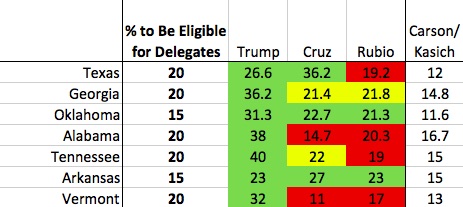Ben Carson and John Kasich will finish far from the top on Super Tuesday. But their presence in the campaign could do more than merely limit votes for Ted Cruz and Marco Rubio.
The complicated way the Republican party awards delegates by state to the nominating convention makes Carson and Kasich consequential, even if they garner modest support Tuesday. Several of the 11 states voting have minimum percent thresholds that candidates must meet to receive delegates, meaning that 19 percent of the vote in a given state could earn 0 percent of that state’s delegates.
With Cruz and Rubio scrapping for every ounce of support to keep Trump within striking distance, the margins will matter a great deal.
In Texas, Georgia, Tennessee, Alabama, Oklahoma, Arkansas and Vermont, Cruz and Rubio could find themselves on the wrong side of a voting threshold. The table below lists the minimum percent cutoff in each of these states next to the poll numbers for Trump, Cruz and Rubio in each. The combined support of Carson and Kasich is shown in the last column.
A box shaded green indicates that the candidate is at least two percentage points clear of the state’s delegate eligibility threshold. Yellow reflects a candidate within two points of the threshold. Red means a candidate is within one point or is below the threshold.

The most noteworthy result here is in Texas, which awards the most delegates of any state, 155, on Super Tuesday. Rubio is in danger of failing to meet the 20 percent requirement there, which not only would be costly to his delegate count, but would potentially hand Cruz a victory at the polls as much as a victory in the media. The Florida senator would have to make up the gap elsewhere to help make his case that he’s the clear alternative to Donald Trump in the GOP contest.
Although Georgia, Alabama, and Tennessee are each worth many fewer delegates than Texas, they’re worth more delegates (184) than Texas combined. Cruz and Rubio are in danger of falling short of the threshold in each of the three states. (It’s worth noting that party officials in each of these states tell THE WEEKLY STANDARD that the 20 percent floor is a hard number — not rounded up from, say, 19.5 percent.) It’s the same story in Vermont, but it’s worth only 16 total delegates.
Cruz’s and Rubio’s flirtation with these percentage cutoffs shows how Carson and Kasich could help shape Tuesday’s results, even though they’re virtually guaranteed to finish no better than fourth in the aforementioned Super Tuesday states. The votes they receive could keep Cruz, Rubio or both from netting any delegate support in certain places.
Additionally, because Georgia, Alabama, and Tennessee have “backdoor” winner-take-all rules, Trump could sweep certain categories of delegates in a state merely by being the only person to receive 20 percent support. As political scientist Josh Putnam’s website explains, “Under the rules in some states, it is possible for a candidate to win all of the at-large and/or congressional district delegates if that candidate is the only one over the qualifying threshold.”
At-large and congressional district delegates comprise the overwhelming majority of total delegates in all states. The only other delegates are Republican National Committee members, of which there are three in each state.
Carson and Kasich have both vowed to continue their campaigns, with the retired neurosurgeon explaining his reasoning in a FOX News op-ed Monday, and the Ohio governor expecting to use a victory in his home state in two weeks to catapult his campaign to the top tier.
